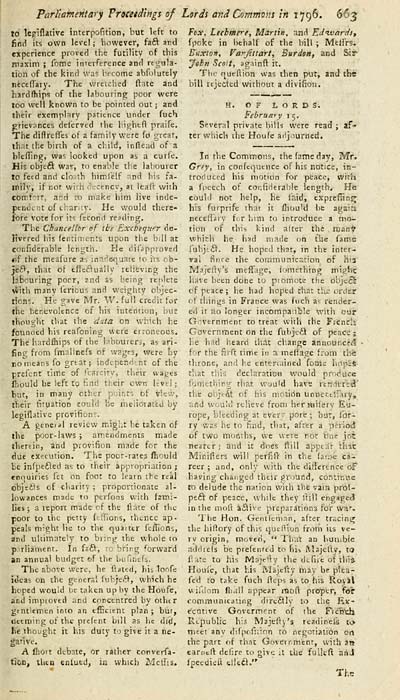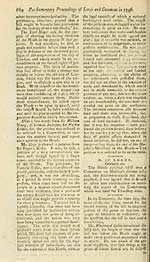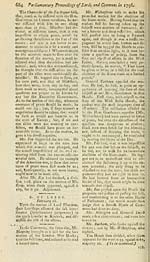Download files
Complete book:
Individual page:
Thumbnail gallery: Grid view | List view

Parl'iamentary Procetdhigs of Lords a7:d Commons in 1796. 663
to Icgiflative interpofition, but left to
find its own level ; however, faft and
experience proved the futility of this
maxim ; fome interference and regula-
tion of the kind was 1-tcome abfolutely
ntcefTary. The wrtiched ftnte and
hardlhips of the labouring poor were
too well known to be pointed out ; and
their exemplary patience under fuch
grievances del'erved ihe hi^hefl praife.
The diflrelTes of a family were fo great,
th.it the birth of a child, inflead of a
bleffing, was looked upon as a curie.
His objeft was, to enable the labourer
to fetd and cloath himi'eif and his fa-
mily, if not wiih ^'j.-ency, at leail: with
corr.f-^rr, and to make him live inde-
pendent of thar.'.y. He would there-
fore vote for its fecond re?ding.
The Chancellor of tbe Exchequer de-
livered his fentimcnts uyon the bill at
confiderable length. He difjpproved
#if the meafure as inadequate to its ob-
jtB, that of fcflc£lually relieving the
labouring peer, and as being replete
\5ith many ierious and weighty objec-
tions. He gave Mr. W. full credit for
the benevolence of his intention, buj
thought that the data on which he
foiintied his reafcning were erroneous.
The hardfhips of the labourers, as ari-
fing from fmallnefs of wages, were by
no means fo grtat; independent of the
prefcnt time of Icarciry, their wages
Iliould be left to find their own Uvel ;
but, in many other p.;ifit5 of View,
their Inuation could be meliorated by
legiflative provifions.
A geneial review might be taken of
the poor-laws ; amendments made
therein, and provifion made for the
due execution. The poor-rates fhould
be infpefled as to their appropriation ;
enquiries let on foot to learn the real
objtfls of charity ; proportionate al-
lowances made to perfons with fami-
lies; a report made rf the Ihue of the
poor to the petty f'.flions, thence ap-
peals might lie to the quarter Icflions,
and ultimately to bi:pg the whole to
p.irliament. In faft, to bring forward
an annual budget of ilie bufinefs.
The above were, he ftated, his loofe
ideas on the general lubjeft, which he
hoped would be taken up by the Houfe,
and impioved and concentred by other
gentlemen into an efficient plan ; bur,
deeming of the prelent bill as he did,
F»e thought it his duty to give it a ne-
gative.
A fcoit debate, or rather converfa-
tioo, ilitn enlued, in which Mcllis,
Fox, Lecbmgre, Martin, and "Edivardsy
fpokc in i)ehalf of the bill ; Meilrs.
Buxton, Varfitidrt, Burdott, and Sir
John Scott, ag^inft it.
The queflion was then put, and the
bill rejected without a divifion.
H. OF LORDS.
February i 5.
Several private bills were read ; af^
ter which the Houfe adjourned.
In the Commons, the fame day, Mr.
Grey, in confccjuence of his notice, in-
troduced his motion for peace, wita
a fpeech of confiderable length. He
eouM not help, he i?.id, txprefijn^
his furprife that it fliould be again
nec£fl.iry for him to introduce a mo-
tion of this kind after the man^
whifch he had made on the fame
fubjtif. He hoped tbat, in the inter-
val f^nce the communication of his
Majeffy's meffage, i'Mnething might:
have been done to promote the objeii
of peace; he had hoped that tlic order
of things in France was fuch as render-
ed it no longer incompaiible with our
Government to treat with the Frencli
Government on the fubjefl of peace;
he had heard that change announcfv4
for the firft time in a meflage from tl^
throne, and he entertained foale hdpifi
that this declaration would produce
fomethire that wauld have rtndtri-^'
the objtdt of his motion Unnect'Jary,
artd woultl relieve from hermiferv Eu-
rope, bleeding at every pore; bur, lor-
ry was he to find, that, afrer a period
of two months, we were not tine jot
nearer; and it does ftill appear that
Minifiers will peffift in the (a:;>c ca-
reer ; and, only with the difference of
having changed their ground, continue
to delude the nation with the vain prol-
peft of peace, wliile they liill engaged
in the mod: a.9ive preparations for vvar»
The Hon. Gentleman, after tracinj^
the hiflory of this queOiun from its ve-
ry origin, moved, " Tliat an humbie
addrels be prefenred to hib ftlajcRy, to
I'lHte to his Majerty the defire of tliis
Houie, that his Majefty may be plea-
fed to take fuch fleps as to his Roy'al
wil'dom (hall appear raof\ proper, for
communicating direftly to the Ev-
ecntive Goverment of the Fienth
Republic his Majeflj's readinels to
meet anv difpofition to negotiation on
the part of that Govetrimenr, with an
carncft defire to give it the fuUtfi ahJ
fpeediefl dlea."
The
to Icgiflative interpofition, but left to
find its own level ; however, faft and
experience proved the futility of this
maxim ; fome interference and regula-
tion of the kind was 1-tcome abfolutely
ntcefTary. The wrtiched ftnte and
hardlhips of the labouring poor were
too well known to be pointed out ; and
their exemplary patience under fuch
grievances del'erved ihe hi^hefl praife.
The diflrelTes of a family were fo great,
th.it the birth of a child, inflead of a
bleffing, was looked upon as a curie.
His objeft was, to enable the labourer
to fetd and cloath himi'eif and his fa-
mily, if not wiih ^'j.-ency, at leail: with
corr.f-^rr, and to make him live inde-
pendent of thar.'.y. He would there-
fore vote for its fecond re?ding.
The Chancellor of tbe Exchequer de-
livered his fentimcnts uyon the bill at
confiderable length. He difjpproved
#if the meafure as inadequate to its ob-
jtB, that of fcflc£lually relieving the
labouring peer, and as being replete
\5ith many ierious and weighty objec-
tions. He gave Mr. W. full credit for
the benevolence of his intention, buj
thought that the data on which he
foiintied his reafcning were erroneous.
The hardfhips of the labourers, as ari-
fing from fmallnefs of wages, were by
no means fo grtat; independent of the
prefcnt time of Icarciry, their wages
Iliould be left to find their own Uvel ;
but, in many other p.;ifit5 of View,
their Inuation could be meliorated by
legiflative provifions.
A geneial review might be taken of
the poor-laws ; amendments made
therein, and provifion made for the
due execution. The poor-rates fhould
be infpefled as to their appropriation ;
enquiries let on foot to learn the real
objtfls of charity ; proportionate al-
lowances made to perfons with fami-
lies; a report made rf the Ihue of the
poor to the petty f'.flions, thence ap-
peals might lie to the quarter Icflions,
and ultimately to bi:pg the whole to
p.irliament. In faft, to bring forward
an annual budget of ilie bufinefs.
The above were, he ftated, his loofe
ideas on the general lubjeft, which he
hoped would be taken up by the Houfe,
and impioved and concentred by other
gentlemen into an efficient plan ; bur,
deeming of the prelent bill as he did,
F»e thought it his duty to give it a ne-
gative.
A fcoit debate, or rather converfa-
tioo, ilitn enlued, in which Mcllis,
Fox, Lecbmgre, Martin, and "Edivardsy
fpokc in i)ehalf of the bill ; Meilrs.
Buxton, Varfitidrt, Burdott, and Sir
John Scott, ag^inft it.
The queflion was then put, and the
bill rejected without a divifion.
H. OF LORDS.
February i 5.
Several private bills were read ; af^
ter which the Houfe adjourned.
In the Commons, the fame day, Mr.
Grey, in confccjuence of his notice, in-
troduced his motion for peace, wita
a fpeech of confiderable length. He
eouM not help, he i?.id, txprefijn^
his furprife that it fliould be again
nec£fl.iry for him to introduce a mo-
tion of this kind after the man^
whifch he had made on the fame
fubjtif. He hoped tbat, in the inter-
val f^nce the communication of his
Majeffy's meffage, i'Mnething might:
have been done to promote the objeii
of peace; he had hoped that tlic order
of things in France was fuch as render-
ed it no longer incompaiible with our
Government to treat with the Frencli
Government on the fubjefl of peace;
he had heard that change announcfv4
for the firft time in a meflage from tl^
throne, and he entertained foale hdpifi
that this declaration would produce
fomethire that wauld have rtndtri-^'
the objtdt of his motion Unnect'Jary,
artd woultl relieve from hermiferv Eu-
rope, bleeding at every pore; bur, lor-
ry was he to find, that, afrer a period
of two months, we were not tine jot
nearer; and it does ftill appear that
Minifiers will peffift in the (a:;>c ca-
reer ; and, only with the difference of
having changed their ground, continue
to delude the nation with the vain prol-
peft of peace, wliile they liill engaged
in the mod: a.9ive preparations for vvar»
The Hon. Gentleman, after tracinj^
the hiflory of this queOiun from its ve-
ry origin, moved, " Tliat an humbie
addrels be prefenred to hib ftlajcRy, to
I'lHte to his Majerty the defire of tliis
Houie, that his Majefty may be plea-
fed to take fuch fleps as to his Roy'al
wil'dom (hall appear raof\ proper, for
communicating direftly to the Ev-
ecntive Goverment of the Fienth
Republic his Majeflj's readinels to
meet anv difpofition to negotiation on
the part of that Govetrimenr, with an
carncft defire to give it the fuUtfi ahJ
fpeediefl dlea."
The
Set display mode to: Large image | Transcription
Images and transcriptions on this page, including medium image downloads, may be used under the Creative Commons Attribution 4.0 International Licence unless otherwise stated. ![]()
| Early Gaelic Book Collections > Ossian Collection > Gentleman's magazine, and historical chronicle > Volume 66, Part 2 > (139) |
|---|
| Permanent URL | https://digital.nls.uk/79423439 |
|---|
| Description | Selected books from the Ossian Collection of 327 volumes, originally assembled by J. Norman Methven of Perth. Different editions and translations of James MacPherson's epic poem 'Ossian', some with a map of the 'Kingdom of Connor'. Also secondary material relating to Ossianic poetry and the Ossian controversy. |
|---|
| Description | Selected items from five 'Special and Named Printed Collections'. Includes books in Gaelic and other Celtic languages, works about the Gaels, their languages, literature, culture and history. |
|---|

